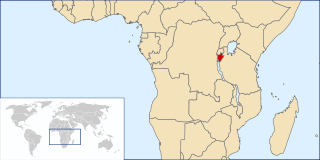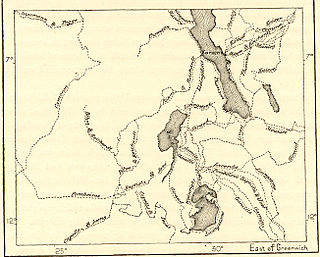An international decoration is a military award which is not bestowed by a particular country, but rather by an international organization such as the United Nations or NATO. Such awards are normally issued as service medals, for participation in various international military operations, and not for specific acts of heroism or bravery.
The Peace and Security Council (PSC) is the organ of the African Union in charge of enforcing union decisions. It is patterned somewhat after the United Nations Security Council. The PSC is also the main pillar of the African Peace and Security Architecture (APSA), and works with other pillars of the APSA in order to promote "peace, security and stability in Africa". The specific goal of the Peace and Security Council (PSC) is the "prevention, management and resolution of conflicts". To achieve these goals, it involves subsidiary organizations such as the Military Staff Committee and the Committee of Experts.

The United Nations Operation in Burundi (ONUB) was established by United Nations Security Council in May 2004 to ensure the continuation of the Arusha Peace and Reconciliation Agreement signed on 28 August 2000.

The African Union Mission in Somalia (AMISOM) is an active, regional peacekeeping mission operated by the African Union with the approval of the United Nations Security Council. It is mandated to support transitional governmental structures, implement a national security plan, train the Somali security forces, and to assist in creating a secure environment for the delivery of humanitarian aid. As part of its duties, AMISOM also supports the Federal Government of Somalia's forces in their battle against Al-Shabaab militants.

The United Nations Integrated Office in Burundi (BINUB) was established by the United Nations Security Council to support the government of Burundi in its efforts towards long-term peace and stability and to replace the work of United Nations Operation in Burundi (ONUB). Its mandate was scheduled to begin on 1 January 2007 for an initial 12 months, and its creation and mission was as a result of recommendations in a report by the Secretary-General.
The United Nations Peacekeeping efforts in 1948. Its first activity was in the Middle East to observe and maintain the ceasefire during the 1948 Arab–Israeli War. Since then, United Nations peacekeepers have taken part in a total of 72 missions around the globe, 14 of which continue today. The peacekeeping force as a whole received the Nobel Peace Prize in 1988.

The following outline is provided as an overview of and topical guide to Burundi:

United Nations Security Council resolution 1375, adopted unanimously on 29 October 2001, after reaffirming all resolutions and statements by the President of the Security Council on the civil war in Burundi, endorsed efforts by South Africa and other states to implement the Arusha Accords and supported the establishment of an interim multinational security presence in Burundi.

United Nations Security Council Resolution 1545, adopted unanimously on 21 May 2004, after recalling all resolutions on the situation in Burundi, particularly Resolution 1375 (2001), the Council established the United Nations Operation in Burundi (ONUB) to bring about peace and national reconciliation in the country.

United Nations Security Council resolution 1565, adopted unanimously on 1 October 2004 after recalling all previous resolutions on the situation in the Democratic Republic of the Congo, extended the mandate of the United Nations Mission in the Democratic Republic of Congo (MONUC) until 31 March 2005 and authorised an additional deployment of 5,900 troops and police. It reaffirmed the commitment to respect the “sovereignty, territorial integrity and political independence [sic]” of Congo and States in the region.

United Nations Security Council resolution 1577, adopted unanimously on 1 December 2004, after recalling Resolution 1545 (2004) on the situation in Burundi, the Council extended the mandate of the United Nations Operation in Burundi (ONUB) for a period of six months until June 1, 2005.

United Nations Security Council resolution 1602, adopted unanimously on 31 May 2005, after recalling resolutions 1545 (2004), 1565 (2004), 1577 (2004) and 1596 (2005) on the situation in Burundi, the Council extended the mandate of the United Nations Operation in Burundi (ONUB) for a period of six months until 1 December 2005.

United Nations Security Council Resolution 1650, adopted unanimously on 21 December 2005, after recalling Resolution 1545 (2004) regarding the situation in Burundi, the Council extended the mandate of the United Nations Operation in Burundi (ONUB) until 1 July 2006.

United Nations Security Council Resolution 1653, adopted unanimously on January 27, 2006, after recalling previous resolutions concerning the situations in the African Great Lakes region, Democratic Republic of the Congo and Burundi, particularly resolutions 1625 (2005), 1631 (2005), 1649 (2005) and 1650 (2005), the Council addressed the stability of the Great Lakes region in Africa.

United Nations Security Council Resolution 1669, adopted unanimously on April 10, 2006, after recalling previous resolutions concerning the situation in Burundi and the Democratic Republic of the Congo, particularly Resolution 1650 (2005), the Council authorised the redeployment of personnel from the United Nations Operation in Burundi (ONUB) to the United Nations Mission in the Democratic Republic of the Congo (MONUC) until July 1, 2006.

United Nations Security Council Resolution 1692, adopted unanimously on June 30, 2006, after recalling resolutions on the situation in Burundi and the African Great Lakes region, particularly resolutions 1650 (2005) and 1669 (2006), the Council extended the mandate of the United Nations Operation in Burundi (ONUB) until December 31, 2006.

United Nations Security Council Resolution 1711, adopted unanimously on September 29, 2006, after recalling all previous resolutions concerning the situation in the Democratic Republic of the Congo, including resolutions 1565 (2004), 1592 (2005), 1596 (2005), 1621 (2005), 1628 (2005), 1635 (2005), 1671 (2006) and 1693 (2006), and resolutions 1650 (2005), 1669 (2006), 1692 (2006) on the situation in Burundi and the African Great Lakes region, the Council extended the mandate of the United Nations Mission in the Democratic Republic of Congo (MONUC) until February 15, 2007.

United Nations Security Council Resolution 1736, adopted unanimously on December 22, 2006, after recalling all previous resolutions concerning the situation in the Democratic Republic of the Congo, in Burundi and in the Great Lakes region of Africa, the Council increased the military strength of the United Nations Mission in the Democratic Republic of Congo (MONUC) from January 1, 2007 to February 15, 2007.

Lieutenant General Derrick Mgwebi is a South African military commander, serving as Director of the Joint Operations Division.












